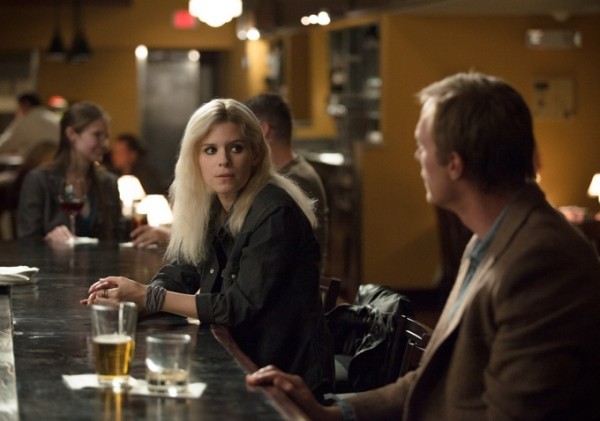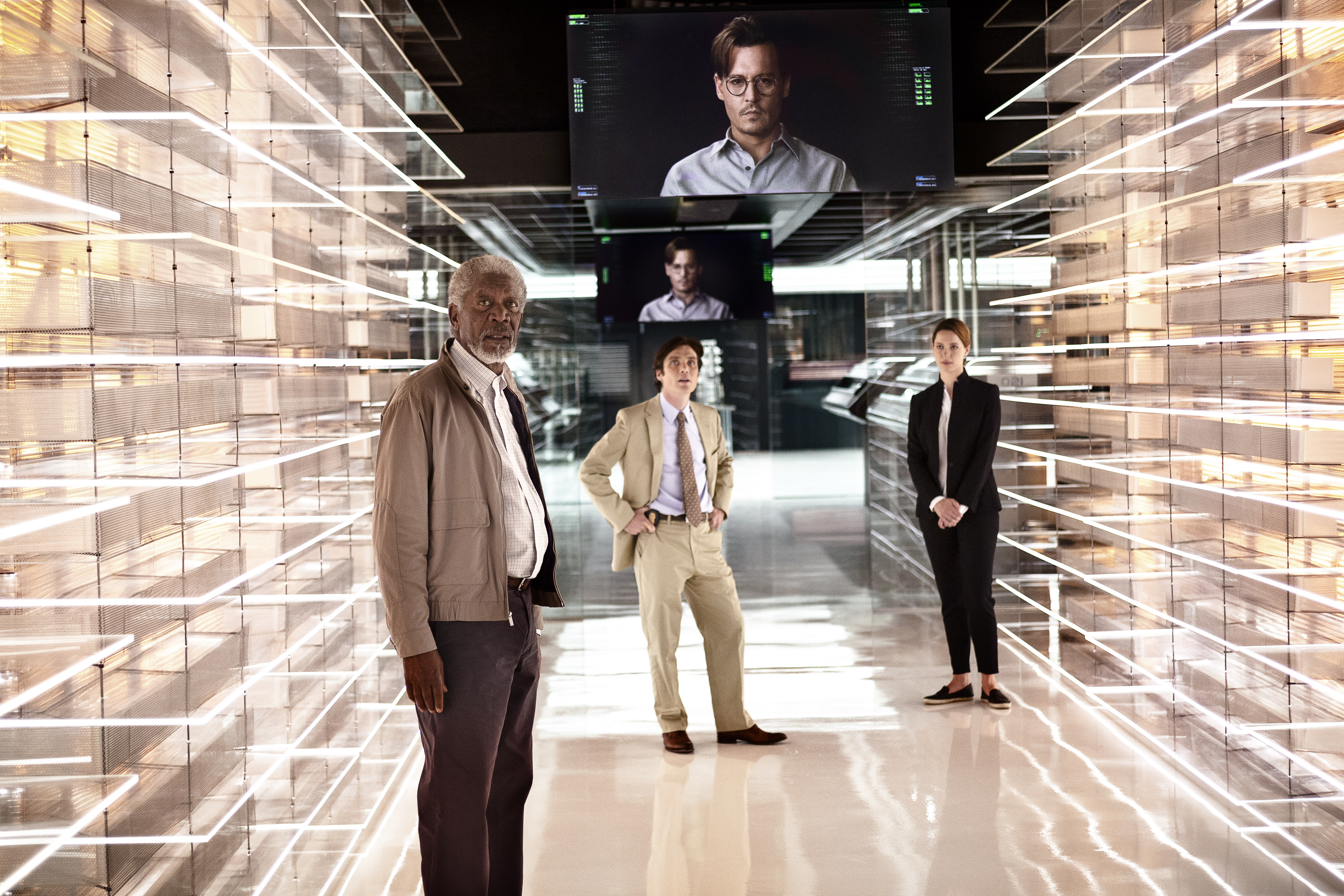I don't know what debuting director Wally Pfister, a gifted cinematographer in his films with Christopher Nolan, was hoping to extract from the surprise-free script by Jack Paglen. But all I can cull is: don't mess with Mother Nature and absolute power corrupts absolutely. Fortune-cookie stuff. Erase All.
- Peter Traves, Rolling Stone
After a cool, subdued, intellectually stimulating first act, the film offers an idea so impossible to digest, a concept that so obviously should have been poisoned at the script stage, that it beggars belief (literally) – and then bases the rest of the film around it. It doesn’t recover.
- CJ Johnson, ABC radio Australia
This is like a heavy-handed and humourless version of Spike Jonze's postmodern comedy Her, mulched in with the old sci-fi novel Donovan's Brain, about keeping someone's brain alive in a tank. We are invited to believe in Johnny Depp as a mathematical genius in the field of artificial intelligence.
- Peter Bradshaw, The Guardian
Yet there were also some positive reviews
TRANSCENDENCE, scripted by Jack Paglen, isn't your average sci-fi thriller, but a terrifically exciting exploration into the corruption of total power. The plotting is clever if, at times, not easy to follow, and the characters are given more complex motives than you find in lesser sci-fi movies. Johnny Depp is impressive as the quiet but increasingly fanatical genius whose evolution is the film's core, and the strong supporting cast includes Morgan Freeman as a more sceptical scientist, Kate Mara as the leader of the violent resistance, and Cillian Murphy as a CIA agent. Visually and dramatically, TRANSCENDENCE is a cut above the average, a film of ideas as well as thrills.
- At the Movies with Margaret and David
For the moment, anyone with a fondness for broad canvas, ideas-heavy sci-fi should ignore the negative scuttle and give Transcendence the benefit of the doubt. It may not be perfect, but it's a sincerely ambitious first feature from a film-maker who has both the technical skill and artistic vision to aim for the stars.
- Mark Kermode, The Observer
So what did I think?
Scathing reviews always prepare you for disappointment, so it was a pleasant surprise to see that I actually ENJOYED the film. It is not an action packed techno-thriller, but a science fiction and love story.
Dr Will Caster (Depp) is an inspirational researcher into Artificial Intelligence, and his wife Evelyn Caster is a researcher in her own right. Their good friend Max Waters (Paul Bettany), who is another scientist with a basis in programming ad philosophy joins with them to do a presentation on Artificial Intelligence in the hope they will be given a grant to continue their research. The presentation appears to be a success, but Will is shot by anti-technology terrorists with a bullet that leaves him with radiation poisoning, and he is given a month to live. These terrorists had also simultaneously hit AI labs across the globe, bringing their agenda to the forefront.
One lab had successfully managed to upload a Rhesus monkey's consciousness into a computer, and Evelyn decides she wants to do this for Will. He agrees, and in his dying days Will is hooked up to the machines and the electrical data from his brain is uploaded to the giant mega computer that Will had built as part of his AI project.
Eventually Will dies and Evelyn and is consumed with trying to make the AI work. She's about to throw it all in when there is a response and they realise that the transfer worked. Will wants more knowledge, he needs access to the internet, be global. Max has his hesitations, but he seems happy at the time that the procedure was a success.
As he leaves and having a drink, the anti-technology group approaches him, appealing to him to see what an abomination he has made, and how it is a threat to them all. He tries to leave, but they kidnap him. They initiate an attack to try to stop Will's upload into the internet, but were unsuccessful. Now he is out there, global, in every system, all over the world.
Will and Evelyn need more power. So they move to desert town and build up a massive underground server complex and massive solar farm to power it. Will begins to use nanotechnology to heal human diseases, revive dead plants - in fact, to change the world. The technology is amazing and a little scary.
As the movie moves on Max converts to the terrorists way of thinking and designs a virus to bring Will down. This would mean that technology all over the world would be affected, shutting down technology would set civilisation back a century.
Evelyn begins to believe Max and offers herself as the carrier of the virus. But at the end, you see that Will sees that everyone is afraid of him, though that was not the intention and he uploads the virus into himself via Evelyn and essentially kills himself.
I really enjoyed this film. The concept is not new - of a human-like AI - but the exploration of how we humans think how a machine would behave and how they would think. The fear of how we, as less intellectual and less than perfect beings would exist in a world where a logical sentient being has the ability to run our existence like a god - it was entertaining, and thought provoking. There was criticism that the end of the film, that an omnipotent computer brain was able to be undone by a simple virus that it knew about and did not undertake measures to preserve itself. That however, was the clutch of the story - throughout the whole movie there was a fear that the new AI was going to destroy mankind and turn everyone into networked slaves (I'm thinking Star Trek Borg), but in the end, the AI was still the essence of the human, who loved his wife, and was trying to make her dream come true (which was to heal the world, eradicate disease) and he accepted that humanity was not ready for the revolution that he was bringing, and so accepted his death. Much more human than computer. I found that really evocative. As expected with an academy award winner for cinematography, the movie is beautiful.
Another criticism is that the storyline was not believable. I think they're referring to the nanotechnology. I admit that nanotech scares me because if they are like programs, or a virus, then they can mutate into something else, divert from their purpose. The nanites were reapiring everything from the materials in the ground, using organic matter to reconstruct organic matter (like dead leaves or damaged eyes). It may sound outrageous now but in the future that may really be how technology works.
This is a work of science fiction. It's not meant to be a blockbuster. I think it left a lot of food for thought especially in the post apocalyptic period. I felt that the scathing reviews did the movie no justice. But I recommend that you see it for yourself and decide - it's not the bitter disappointment that everyone has made it out to be.







No comments:
Post a Comment